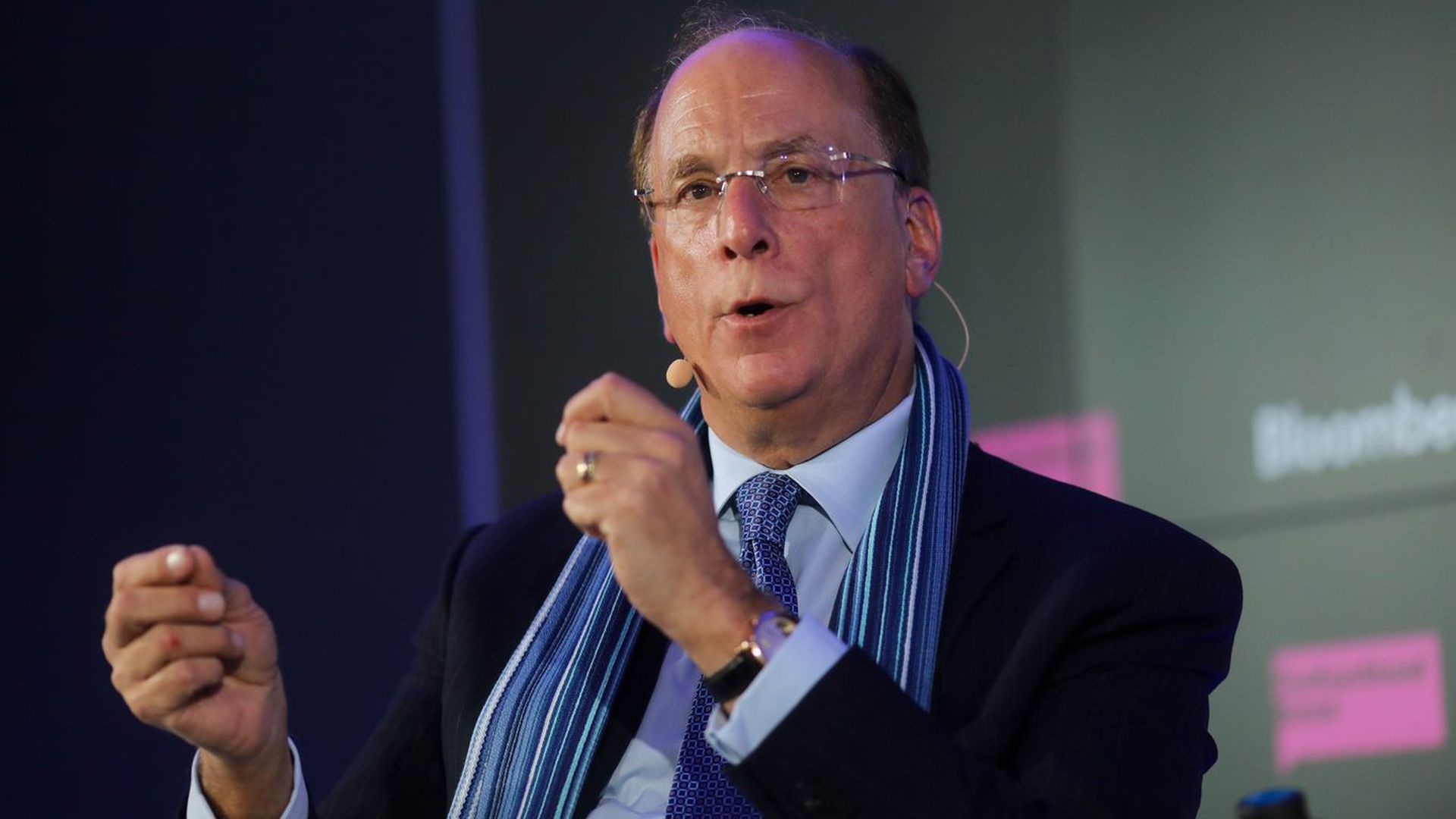| | | | | | | Presented By NetJets | | | | Axios Markets | | By Emily Peck and Matt Phillips ·Mar 24, 2022 | | 🌅 Good day, fine Markets readers! We've got a lot of big ideas to explain — on climate, on infrastructure, on the ruble. But first, we're struggling to understand: How did Scarlett Johansson manage to lose money on a real estate sale in this red-hot market?! 🙀 In a world where Gamestop stock is rising again, perhaps anything is possible. Let's get to it. Today's newsletter is 1,121 words, 4.5 minutes. | | | | | | 1 big thing: Now is the time for big ideas |  | | | Illustration: Sarah Grillo/Axios | | | | A once-in-a-century pandemic, increasing climate-related disasters, the threat of a World War 3-level conflict, and supply chain upheaval are driving increased momentum for big ideas when it comes to updating American infrastructure, and even tackling climate change, Emily writes. The big picture: A paper to be unveiled today from Saule Omarova seeks to create a federal agency — the National Investment Authority — that would direct and facilitate investment in green infrastructure. It's one of many proposals seeking to address the growing pileup of climate and energy-related crises. - The Biden administration has tackled climate with a number of policies and ideas.
- And proposals are coming from less expected corners: JPMorgan Chase CEO Jamie Dimon is pushing the federal government to do more on energy and climate, Axios' Hans Nichols reported this week.
Why it matters: You just need to look at the surge in oil and gas prices and the huge bills racked up after each increasingly worse weather event, to understand that markets alone can't deal with the mega-challenges the U.S. is facing. - Pandemic-driven supply chain bottlenecks were a wake-up call for many policymakers, and the war in Ukraine is driving increased interest in a transition to clean energy. (BlackRock's Larry Fink says more on this below.)
- "There's almost no path to physically developing a more sustainable economy that doesn't require significant public investment," said Adie Tomer, a senior fellow at Brookings who focuses on infrastructure policy.
Catch up fast: Omarova has been working on this proposal for a few years. She is a progressive, a fellow at the Berggruen Institute and a Cornell law professor, who gained national recognition when her nomination to lead the Office of the Comptroller of the Currency fell through late last year. - The proposed National Investment Authority would fund projects directly, as well as act as a kind of Fannie Mae for private investment in infrastructure — buying up the debt that backs projects, the way the housing agency buys up mortgages.
- It would be a type of "public venture capital fund," Omarova tells Axios, making proactive investments in promising projects that private sector investors might typically shy away from.
- It's similar to a plan from the Bipartisan Policy Center that would create a Clean Energy Deployment Administration.
While private equity firms invest in certain kinds of infrastructure and even climate tech, they're generally driven by profits — and a public agency would have other goals in mind, like the public interest and long-term sustainability. Reality check: Mention climate these days and the political blowback will follow. The chances of any big ideas becoming real are slim. - "It's a trillion-dollar question," Omarova said. "If I knew how to sell [this] effectively to politicians, I would have done it by now."
Go deeper. |     | | | | | | 2. Catch up quick | | 📈 Russia's stock market reopened partially today climbing 5%. (CNBC) 🚫 Toshiba shareholders voted down a restructuring plan. (AP) |     | | | | | | 3. Charted: Ruble rescue |  Data: FactSet; Chart: Axios Visuals Russia's ruble has rebounded sharply in recent weeks, as officials cobbled together an unorthodox defense of the currency, Matt writes. Driving the news: The latest effort to shore up support came in the form of a direct demand from President Vladimir Putin that Europe — or as he put it, "unfriendly countries" — pay for Russian natural gas using rubles, rather than dollars or euros. - It's essentially an effort by Russia to create demand for the currency — and the ruble jumped nearly 8% on the news.
State of play: Sanctions imposed after Russia's invasion of Ukraine have hammered the value of the ruble, vaporizing roughly 90% of its value against the dollar at times this year. - The government took measures — like raising interest rates, halting currency trading, and demanding Russian companies exchange their foreign earnings for rubles — that slowed and ultimately stabilized the currency.
Yes, but: Putin's latest gambit has already been labeled a breach of contract by German officials. If it prompts full rupture with Europe, which buys 40% of its gas from Russia, the ruble will likely fall again. - Yes, but, but: Such a break would also make Europe's energy crisis much worse. European natural gas prices surged 30% after Putin made his demand.
|     | | | | | | A message from NetJets | | NetJets helps you do more and miss less | | |  | | | | NetJets Owners enjoy guaranteed access to the largest, most diverse fleet of private jets in the world. Their luxury aircraft feature cutting-edge technology and multiple entertainment options—for increased productivity or ultimate relaxation—so you can make the most of your travel time. | | | | | | 4. 🌎 🛑 Fink calls an end to era of globalization |  | | | Larry Fink at the World Economic Forum in Davos, Switzerland, Jan. 21, 2020. Photo: Simon Dawson/Getty Images | | | | Larry Fink, the CEO and founder of the largest asset management firm on the planet, says the era he helped build is effectively over, Emily writes. - "The Russian invasion of Ukraine has put an end to the globalization we have experienced over the last three decades," Fink writes in his annual letter to shareholders of BlackRock, published today.
Why it matters: Fink is echoing what's quickly become the conventional wisdom: That the economic disruptions put in motion by Russia's unprecedented act of war, coming on top of pandemic supply chain upheaval, have essentially killed off the economic world order established at the end of the Cold War. - The war marks "a turning point in the world order of geopolitics, macro-economic trends, and capital markets," he writes.
The big picture: After decades of outsourcing manufacturing around the world, companies and governments are looking at ways to shield themselves from big global disruptions by making more stuff domestically. - Or, as Fink put it, "re-evaluate their dependencies and re-analyze their manufacturing and assembly footprints."
- In the long term, the war will also help accelerate the transition to green energy — though there will be a lot of brown energy in the short term, he writes.
Go deeper: Read Fink's annual letter to shareholders |     | | |  | | | | If you like this newsletter, your friends may, too! Refer your friends and get free Axios swag when they sign up. | | | | | | | | 5. Big banks' crypto thaw |  | | | Illustration: Sarah Grillo/Axios | | | | The country's biggest banks have realized they can no longer ignore cryptocurrencies, Axios' Hope King and Brady Dale write. Why it matters: Wall Street skepticism around bitcoin and other similar assets have — after more than a decade — given way to eagerness and planning. Driving the news: Goldman Sachs this week became the first major U.S. bank to make an OTC trade of a crypto option, or a bet on the future price of a crypto asset, the company confirmed to Axios. The transaction was facilitated by Galaxy Digital, an investment management firm. - Translation: Goldman took on principal risk in the trade — something that newer crypto native OTC platforms, such as Genesis and Cumberland, have been designed to do specifically.
- Separately, Morgan Stanley is set to become the first big U.S. bank to offer its wealthiest clients access to funds that hold bitcoin directly.
What they're saying: "It's yet another bridge to help institutional traders overcome the various barriers of entry that have historically plagued the ecosystem," Ali Hassan, a partner at Perceptive Capital, tells Axios. The bottom line: There isn't a single asset manager who isn't thinking about cryptocurrency as a diversified asset class, Gunjan Kedia, U.S. Bank's vice chair of wealth management, told CNBC in an interview. Keep reading this story ... And sign up for Axios' upcoming cryptocurrency newsletter. |     | | | | | | A message from NetJets | | NetJets helps you do more and miss less | | |  | | | | NetJets Owners enjoy guaranteed access to the largest, most diverse fleet of private jets in the world. Their luxury aircraft feature cutting-edge technology and multiple entertainment options—for increased productivity or ultimate relaxation—so you can make the most of your travel time. | | | | 🎂 Before you go, join us in wishing a happy 1st birthday to Axios Latino! Sign up for the twice-weekly newsletter and join the team tomorrow for a conversation about the political allegiances of U.S. Latinos at 12 pm ET. |  | It's called Smart Brevity®. Over 200 orgs use it — in a tool called Axios HQ — to drive productivity with clearer workplace communications. | | | | | | Axios thanks our partners for supporting our newsletters. If you're interested in advertising, learn more here.
Sponsorship has no influence on editorial content. Axios, 3100 Clarendon Blvd, Suite 1300, Arlington VA 22201 | | | You received this email because you signed up for newsletters from Axios.
Change your preferences or unsubscribe here. | | | Was this email forwarded to you?
Sign up now to get Axios in your inbox. | | | | Follow Axios on social media:    | | | | | |












No comments:
Post a Comment